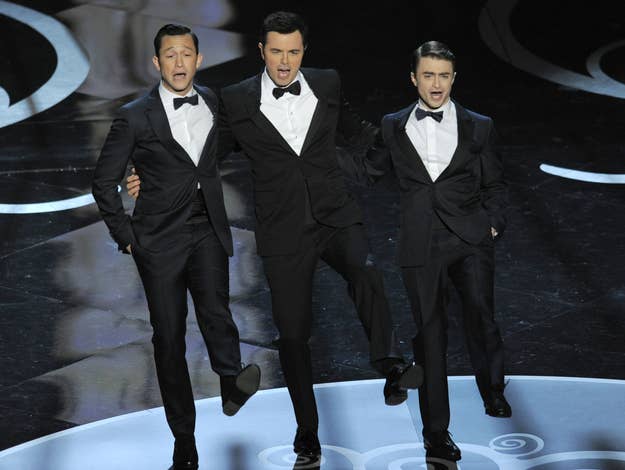
If you were offended by Seth MacFarlane's Oscar hosting last night and you hang out on the internet, then you probably know you aren't alone.
But let's be real. Hollywood is still sexist. And it's racist. That's not to say it doesn't occasionally produce wonderful art, but that wonderful art doesn't mean the sexism and racism don't exist.
So why is it at all surprising that on the biggest night of Hollywood's year — in preparation for which, not incidentally, dozens of talented, beautiful women are expected to starve themselves and roll in a pile of sequins — MacFarlane (and the Academy) felt comfortable delivering an onslaught of sexist, racist jokes?
Well, to start, we're just 12 years past the first and only black actress winning the Academy's highest acting prize. And Halle Berry's 2001 win was followed by years of all-white nominees until Gabourey Sidibe's 2009 turn in Precious. (Black male actors haven't fared much better, with only four winners in the history of the awards: Sidney Poitier in 1963 for Lilies of the Field, Denzel Washington in 2001 for Training Day, Jamie Foxx in 2004 for Ray, and Forest Whitaker in 2006 for The Last King of Scotland.)
Berry's now-long-ago win is a reminder that women and people of color are still firmly in the realm of "firsts" when it comes to Hollywood. Sometimes they are "seconds," and sometimes they are "thirds" — but even if they get to fifth and we stop keeping track, there will never be such a thing as "first white man to receive the Best Director award." In 85 years, that particular prize has gone to a woman only once: Kathryn Bigelow in 2009 for The Hurt Locker. Ang Lee was the first non-white person to win it, for Brokeback Mountain in 2005 — and now the second and only, for Life of Pi last night.
Besides the lack of infrastructure supporting the people of color and women who may be the next great directors or editors, life for actresses isn't terribly easy.
Film can be a hostile work environment for many women. Stories of sexism from colleagues and directors and casting abound. And the people calling the shots are mostly white men. Last year the Los Angeles Times found that 94% of Academy voters were white — and 77% were men. And no, there's nothing inherently wrong with white people, or men, or even white men. But that lack of diversity drowns out the voices of people with a different viewpoint. And that's how you get the bizarre, sexist show we saw last night.
The boobs song.
And so the Academy Awards' terrible hosting problem is just a symptom of a larger issue of tunnel vision. MacFarlane, who attempted to get around the lamer conventions of Oscars joke-telling by chucking the insidery, industry bits, still ended up being about as unfunny as every other host in recent memory. What is surprising is how many people thought MacFarlane's you-name-it-ist humor was noteworthy, when it was simply inevitable. MacFarlane hit some low lows in between a number of high points involving women like Shirley Bassey and Barbra Streisand on the stage, but it wasn't exactly a surprise. As my colleague Richard Rushfield put it, the show has become the "killing fields" for even the sharpest comedians. (You may remember Ellen DeGeneres or Chris Rock fondly — but neither was asked to come back to host. One for being a snooze, the other for snubbing the show. And neither boosted ratings the way MacFarlane did.)
Ultimately, it's easy to criticize this year's Oscars as if what transpired was simply a misstep on the part of the host and the Academy. But the Oscars are, in fact, a pretty accurate representation of who actually runs Hollywood. That means the audience gets to watch awesome performers and artists sharing a stage with weak jokes and cheap shots. A better Hollywood would beget a better Oscars. No kidding.
